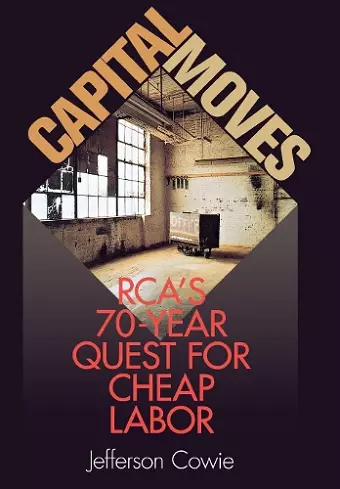Capital Moves
RCA's Seventy-Year Quest for Cheap Labor
Format:Hardback
Publisher:Cornell University Press
Published:1st Apr '99
Currently unavailable, and unfortunately no date known when it will be back

Find a pool of cheap, pliable workers and give them jobs—and soon they cease to be as cheap or as pliable. What is an employer to do then? Why, find another poor community desperate for work. This route—one taken time and again by major American manufacturers—is vividly chronicled in this fascinating account of RCA's half century-long search for desirable sources of labor. Capital Moves introduces us to the people most affected by the migration of industry and, most importantly, recounts how they came to fight against the idea that they were simply "cheap labor."
Jefferson Cowie tells the dramatic story of four communities, each irrevocably transformed by the opening of an industrial plant. From the manufacturer's first factory in Camden, New Jersey, where it employed large numbers of southern and eastern European immigrants, RCA moved to rural Indiana in 1940, hiring Americans of Scotch-Irish descent for its plant in Bloomington. Then, in the volatile 1960s, the company relocated to Memphis where African Americans made up the core of the labor pool. Finally, the company landed in northern Mexico in the 1970s—a region rapidly becoming one of the most industrialized on the continent.
After reading Cowie's thorough and even-handed treatment of highly complex issues, one is left with neither outright despair no giddy optimism.... His intention is to make people aware of the historical forces that have shaped our lives, and how our lives in turn are embedded to these forces.
* Journal of Communication *It does not take long to recognize an excellent book and this is one. With an innovative and successful mix of labor and business history, economic geography, and gender and community studies, Jefferson Cowie writes a complex story of capital migration, class formation and social change.
* Journal of American History *The author brings to life through a well-written narrative and the skilful use of oral history. Fundamentally, Cowie reinforces the need for labour historians and industrial relations scholars to consider both the spatial and temporal dimensions of work.
* Journal of Industrial Relations *The strength of Capital Moves is its narrative, which demonstrates, better than any schematic argument or abstract model could, the persistent logic behind RCA's location decisions.... Its argument is one from which labor can take hope, for it suggests that the strategy of capital relocation is, ultimately, self-undermining.
-- Kimberly Phillips-Fein * New Labor Forum *A compelling reinterpretation of postwar American history.
* American Historical Review *Capital Moves—based impressively on research about four sites and in two languages—exemplifies the salutary effect of the revival of geography on the social sciences. Cowie's core argument—that in spite of the claimed novelty of globalization, spatial factors long have been critical to the stability of capitalist production—deserves close attention.
* Dissent *Labor historian Jefferson Cowie's book, Capital Moves, makes a significant contribution to our understanding of the way 'capital mobility' is enacted on the ground. This important work is a social history in the 'subaltern' tradition.
* The Professional Geographer *This book is significant because of its powerful story, innovative methodology, and the challenges and elaborations it offers to contemporary research on industrial restructuring.
* Contemporary Sociology *This is a thought-provoking and innovative piece of scholarship that deserves a wide audience.
* Choi- Winner of Winner of the 1999 Philip Taft Prize for the Best.
ISBN: 9780801435256
Dimensions: 229mm x 152mm x 27mm
Weight: 907g
288 pages